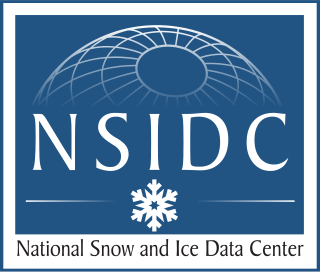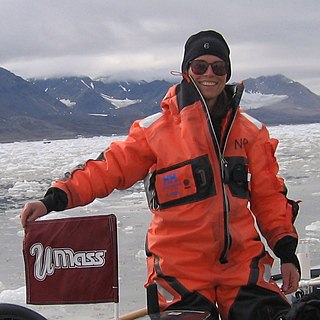Related Research Articles

The University of Colorado Boulder is a public research university in Boulder,Colorado,United States. Founded in 1876,five months before Colorado became a state,it is the flagship university of the University of Colorado system. CU Boulder is a member of the Association of American Universities and is classified among R1:Doctoral Universities –Very high research activity.

The National Snow and Ice Data Center (NSIDC) is a United States information and referral center in support of polar and cryospheric research. NSIDC archives and distributes digital and analog snow and ice data and also maintains information about snow cover,avalanches,glaciers,ice sheets,freshwater ice,sea ice,ground ice,permafrost,atmospheric ice,paleoglaciology,and ice cores.
Sir Nicholas John Shackleton was an English geologist and paleoclimatologist who specialised in the Quaternary Period. He was the son of the distinguished field geologist Robert Millner Shackleton and great-nephew of the explorer Ernest Shackleton.
William Richard Peltier,Ph.D.,D.Sc. (hc),is university professor of physics at the University of Toronto. He is director of the Centre for Global Change Science,past principal investigator of the Polar Climate Stability Network,and the scientific director of Canada's largest supercomputer centre,SciNet. He is a fellow of the Royal Society of Canada,of the American Geophysical Union,of the American Meteorological Society,and of the Norwegian Academy of Science and Letters..
David A. Hodell,FRS is a British–American geologist and paleoclimatologist. In October 2008,Hodell was appointed to the position of Woodwardian Professor of Geology at the University of Cambridge in the United Kingdom,where he is also a fellow of Clare College. He is a dual citizen of the United Kingdom and the United States. He is also the Director of the Godwin Laboratory for Palaeoclimate Research. Previously,he taught at the University of Florida from 1986–2008,earning the rank of full professor in geological sciences. Hodell was also the director of the Stable Isotope Laboratory from 1996–2008. Hodell earned his Ph.D. in 1986 in oceanography from the Graduate School of Oceanography,University of Rhode Island after earning his bachelor of arts in 1980 in geology from the University of Vermont.
Norman Richard Pace Jr. is an American biochemist,and is Distinguished Professor Emeritus of Molecular,Cellular and Developmental Biology at the University of Colorado. He is principal investigator at the Pace lab.
Jason Eric Box is an American glaciologist who is professor in glaciology at the Geological Survey of Denmark and Greenland. For 10 years (2002-2012) he worked at Byrd Polar Research Center at Ohio State University,eventually a tenured physical climatology and geography associate professor in the department of geography.

The Institute of Arctic and Alpine Research (INSTAAR) is a scientific institute that is part of the University of Colorado Boulder. Its research mission is to "[develop] scientific knowledge of physical and biogeochemical environmental processes at local,regional and global scales,and appl[y] this knowledge to improve society's awareness and understanding of natural and anthropogenic environmental change."

Konrad "Koni" Steffen was a Swiss glaciologist,known for his research into the impact of global warming on the Arctic.
Peter Molnar was a professor in Geological Sciences at the University of Colorado. His research focused on aspects of how mountain ranges form and continental lithosphere deforms.

Diane McKnight is a distinguished professor of civil,environmental,and architectural engineering at the University of Colorado Boulder and a fellow at the Institute of Arctic and Alpine Research (INSTAAR). McKnight is a founding principal investigator of the National Science Foundation's Long-Term Ecological Research (LTER) program in the McMurdo Dry Valleys of Antarctica.
John Thomas Andrews is a British-American geologist and professor emeritus of geological and atmospheric and oceanic sciences at the University of Colorado Boulder's Institute of Arctic and Alpine Research (INSTAAR),in Boulder,Colorado,USA.
George Henry Born was an American aerospace engineer,Distinguished Professor,founder and Director Emeritus of the Colorado Center for Astrodynamics Research (CCAR) at the University of Colorado Boulder. He is known for his work in satellite navigation and precise orbit determination. He worked on various missions while at the Jet Propulsion Laboratory as well as navigation support for the Apollo program in the late 1960s while at Johnson Space Center.

James Zachos is an American paleoclimatologist,oceanographer,and marine scientist. He is currently a professor in the Department of Earth and Planetary sciences at University of California,Santa Cruz where he was elected to the National Academy of Sciences in 2017. His research focuses on the biological,chemical,and climatic evolution of late Cretaceous and Cenozoic oceans,and how past climatic conditions help improve forecasts of the consequences of anthropogenic carbon emissions on future climate change.
Jessica E. Tierney (born 1982) is an American paleoclimatologist who has worked with geochemical proxies such as marine sediments,mud,and TEX86,to study past climate in East Africa. Her papers have been cited more than 2,500 times;her most cited work is Northern Hemisphere Controls on Tropical Southeast African Climate During the Past 60,000 Years. Tierney is currently a professor of geosciences and the Thomas R. Brown Distinguished Chair in Integrative Science at the University of Arizona and faculty affiliate in the University of Arizona School of Geography,Development and Environment Tierney is the first climatologist to win NSF's Alan T Waterman Award (2022) since its inception in 1975.

Julie Brigham-Grette is a glacial geologist and a professor in the Department of Geosciences at the University of Massachusetts Amherst where she co-directs the Joseph Hartshorn Quaternary Laboratory. Her research expertise is in glacial geology and paleoclimatology;she has made important contributions to Arctic marine and terrestrial paleoclimate records of the late Cenozoic to recent periods,the evolution of the Arctic climate,especially in the Beringia/Bering Strait region,and was a leader of the international Lake El’gygytgyn Drilling Project in northeastern Russia.
Bronwen Konecky is a paleoclimatologist and climatologist whose particular area of focus lies in the past and present effect of climate change in the tropics. She is an assistant professor in the Department of Earth and Planetary Sciences at Washington University in St. Louis.
Tania Schoennagel is an ecologist who specializes in wildfires and insect outbreaks. She is a research scientist at the University of Colorado,Boulder and has been involved with INSTAAR since 2011.
Merritt Turetsky is an American ecosystem ecologist and a professor at the University of Colorado Boulder. She currently serves as the Director of Arctic Security for the University of Colorado. She served as the first woman Director of the Institute for Arctic and Alpine Research (INSTAAR) from 2019-2023. Her research considers fire regimes,climate change and biogeochemical cycling in Arctic wetlands. Turetsky is a member of the Permafrost Action Team (SEARCH),a group of scientists who translate and deliver science to decision-makers.
References
- 1 2 3 4 "Gifford Miller: Recipient of the 2005 Easterbrook Distinguished Scientist Award". University of Colorado Boulder. November 20, 2005. Retrieved January 23, 2022.
- ↑ Zalzal, Kate S. (June 20, 2017). "Down to Earth With: Paleoclimatologist Gifford H. Miller". EARTH Magazine. Retrieved January 23, 2022.
- ↑ "New CU-Boulder Geology Building To Be Dedicated On Oct. 30". University of Colorado Boulder. October 20, 1997. Retrieved January 23, 2022.
- ↑ Stevens, William K. (January 2, 1992). "Scientists Suggest Global Warming Could Hasten the Next Ice Age". The New York Times. Archived from the original on November 6, 2012. Retrieved January 23, 2022.
- ↑ "Cooling During Earth's Last Ice Age". University of Colorado Boulder. January 15, 1997. Retrieved January 23, 2022.
- ↑ "CU-Boulder Awards 18 Faculty 2005-06 Research, Creative Work Fellowships". University of Colorado Boulder. November 30, 2004. Retrieved January 23, 2022.
- ↑ "Grantee 2013: GIFFORD H. MILLER". National Geographic . Retrieved January 23, 2022.
- 1 2 "CU-Boulder Faculty Member Elected 2009 American Geophysical Union Fellow". University of Colorado Boulder. March 17, 2009. Retrieved January 23, 2022.
- ↑ "Gifford Miller interviewed for NOVA documentary on Australian Pleistocene megafauna". University of Colorado Boulder. June 24, 2007. Retrieved January 23, 2022.
- ↑ "Gifford H. Miller". University of Colorado Boulder. Retrieved January 23, 2022.
- ↑ "Giff Miller receives 2018 Distinguished Career Award from the American Quaternary Association". University of Colorado Boulder. April 17, 2018. Retrieved January 23, 2022.
- ↑ "6 CU Boulder faculty members become distinguished professors". University of Colorado Boulder. November 5, 2021. Retrieved January 23, 2022.